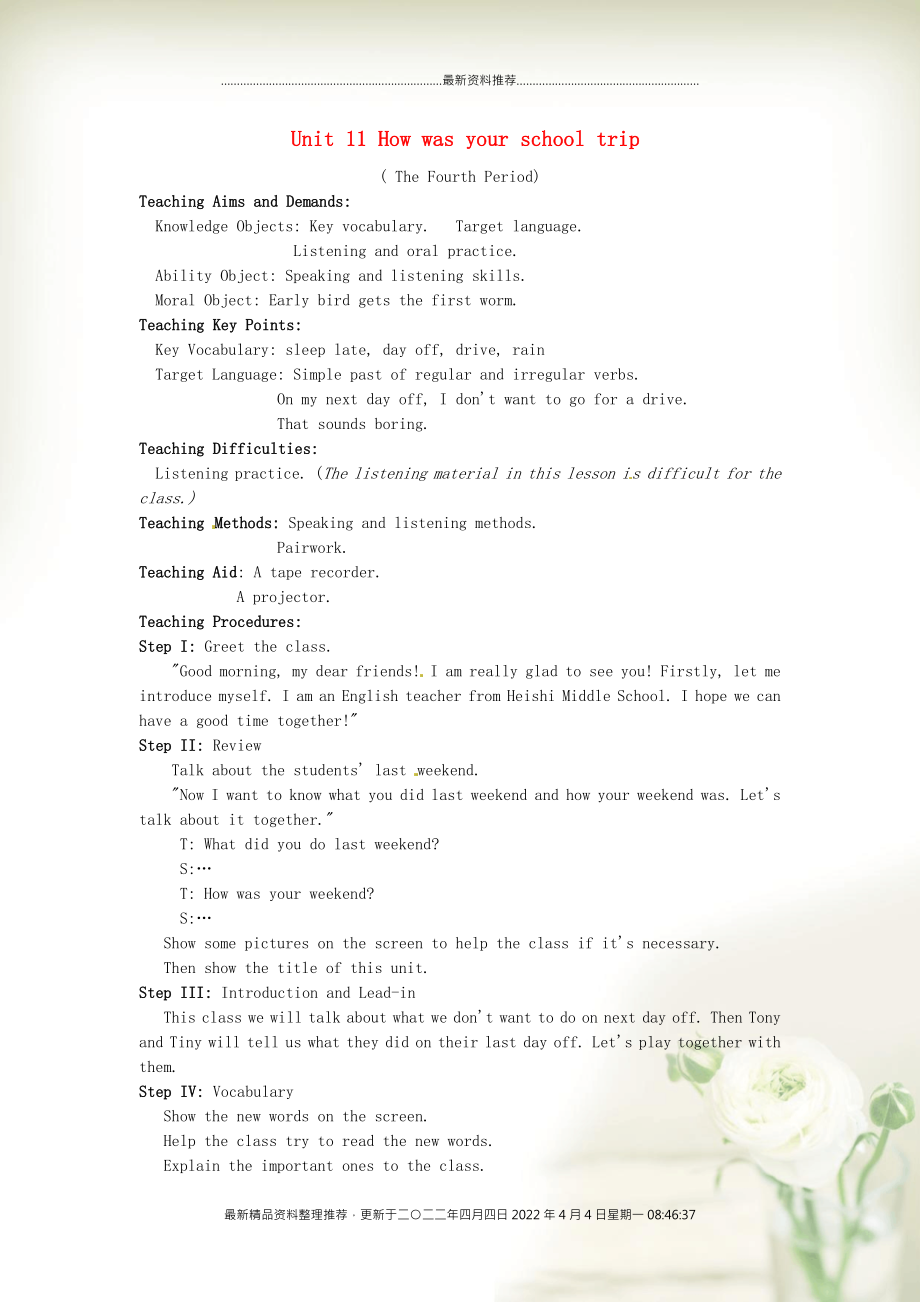《山東省青島市平度市灰埠鎮(zhèn)灰埠中學(xué)七年級英語下冊 Unit 11 How was your school trip教案 (新版)人教新目標(biāo)版》由會員分享�����,可在線閱讀,更多相關(guān)《山東省青島市平度市灰埠鎮(zhèn)灰埠中學(xué)七年級英語下冊 Unit 11 How was your school trip教案 (新版)人教新目標(biāo)版(3頁珍藏版)》請?jiān)谘b配圖網(wǎng)上搜索�����。
1�����、……………………………………………………………最新資料推薦…………………………………………………
Unit 11 How was your school trip
( The Fourth Period)
Teaching Aims and Demands:
Knowledge Objects: Key vocabulary. Target language.
Listening and oral practice.
Ability Object: Speaking and listening skills.
Moral
2�����、 Object: Early bird gets the first worm.
Teaching Key Points:
Key Vocabulary: sleep late, day off, drive, rain
Target Language: Simple past of regular and irregular verbs.
On my next day off, I don't want to go for a drive.
That sounds boring.
Teaching Dif
3�����、ficulties:
Listening practice. (The listening material in this lesson is difficult for the class.)
Teaching Methods: Speaking and listening methods.
Pairwork.
Teaching Aid: A tape recorder.
A projector.
Teaching Procedures:
Step I: Greet the class.
"Good m
4�����、orning, my dear friends! I am really glad to see you! Firstly, let me introduce myself. I am an English teacher from Heishi Middle School. I hope we can have a good time together!"
Step II: Review
Talk about the students' last weekend.
"Now I want to know what you did last weekend and how
5�����、 your weekend was. Let's talk about it together."
T: What did you do last weekend?
S:…
T: How was your weekend?
S:…
Show some pictures on the screen to help the class if it's necessary.
Then show the title of this unit.
Step III: Introduction and Lead-in
This cla
6�����、ss we will talk about what we don't want to do on next day off. Then Tony and Tiny will tell us what they did on their last day off. Let's play together with them.
Step IV: Vocabulary
Show the new words on the screen.
Help the class try to read the new words.
Explain the important ones
7�����、to the class.
1. sleep late 睡過頭�����,起得晚
sleep → slept
eg: Most students sleep late on weekends. But I think we shouldn't sleep late.
I slept late yesterday and I was late for school.
2. drive 駕駛�����,驅(qū)車旅行
go for a drive 開車去兜風(fēng)
3. day off (因病或節(jié)假日)不工作�����;不上學(xué)
8�����、 eg: We have two days off every week.
I have a bad headache and I have to ask for a day off.
B: Oh, really? I think that sounds fun.
Pay attention to the word sound.
Ask pairs of students to read the dialogue above to the class.
Now work with your pa
9�����、rtner. Say how you feel about the activities in 1a. Please make up some new dialogues.
Let several pairs show us their conversations.
Step VI: Listening practice
Read the instructions to the class.
Look at the chart in 2a. And pay attention to the activities in the first column.
Pla
10、y the recording the first time. The students only listen.
Play the tape again. And ask the students to finish the chart.
Check the answers. Let the class answer this question: What did Tony/ Tiny do on his/ her last day off?
Now pay attention to the statements in 2b. And ask several stud
11�����、ents to read the statements.
Play the recording. And ask the class to finish 2b.
Check the answers together.
Step VII: Practice
Complete a letter from Tony.
Translate two sentences.
Step VIII:Summary
Today we have learned what Tony and Tina did on their last day off. And we also talk
12�����、ed about our thoughts. I hope we can keep healthy and get good grades in future. So don't always sleep late on your day off.
Step IX: Homework
Practice 1b and 2c.
Write a short paragraph about what you did on your last day off.
Step X: Blackboard Design
Unit 8 How was your school trip?
A
13�����、: On my next day off, I don't want to go for a drive.
That sounds really boring.
B: Oh, really? I think that sounds fun
took a class
slept late
helped mom and dad
went camping in the rain
Teaching Feeling:
最新精品資料整理推薦�����,更新于二〇二二年四月四日2022年4月4日星期一08:46:37
 山東省青島市平度市灰埠鎮(zhèn)灰埠中學(xué)七年級英語下冊 Unit 11 How was your school trip教案 (新版)人教新目標(biāo)版
山東省青島市平度市灰埠鎮(zhèn)灰埠中學(xué)七年級英語下冊 Unit 11 How was your school trip教案 (新版)人教新目標(biāo)版

